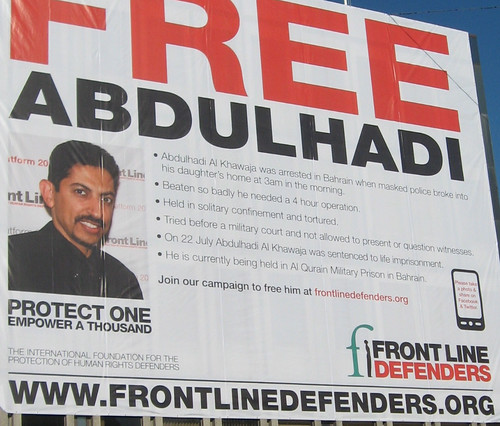But Bahrain still saw considerable unrest. This might be because of its own unique features – it is a Shia Muslim majority country with a Sunni Muslim monarch who has been careful to exclude Shia Muslims from positions of power. This blatant unfairness cannot but have triggered resentment that then erupted when the Arab masses were vitalised by the emerging Arab Spring. Yet the unrest in Bahrain does not seem to have had a particularly sectarian quality*, with both Sunni and Shia Muslims all taking to the streets and looking for freedom.
Sadly, the king of Bahrain has been able to crush the rebellion of his people, at least for now. Several factors allowed him to succeed where Mubarak, Ben Ali, and now Qaddafi failed. One of these was the oil wealth that came the king's way, which had allowed him to build up a mercenary army of thugs from around the Arab world. These people could be relied on to fire on Bahraini protesters because they would not be worrying that the people they were killing could be their friends and relations. The king also had the support of Saudi Arabia, which sent in its own army to help crush the protests; the Saudi rulers were obviously keen to prevent Bahraini protesters succeeding and encouraging their people to follow their example. And the king benefited from the tacit support of the USA and its allies. A US fleet is based in Bahrain, and any democratic transition there might have sent it packing. The Americans also feared that a democratic Bahrain might move into the orbit of Iran.
Since the democracy movement was crushed, Bahrain has been enduring a reign of terror, with protesters and activists rounded up and subjected to torture before receiving long prison sentences in kangaroo courts. This has all happened largely away from the attention of the world, as dramatic and more photogenic events in other countries have taken over the news cycles. That the unrest was crushed relatively quickly has probably also played to the advantage of the king, saving him from the kind of ongoing travails that the Syrian regime is continuing to endure.
In my own country, the involvement of a prestigious medical school here in the education of Bahraini doctors has somewhat kept the Bahraini crisis in the public eye. Although the medical school has largely washed its hands of the crisis, some doctors in Ireland have campaigned to publicise the fate of doctors in Bahrain who have found themselves facing the wrong end of the regime after they took part in protests or simply gave medical treatment to people the regime's thugs had injured. The Front Line Defenders organisation has also tried to keep Bahrain in the spotlight, placing enormous posters in central Dublin concerning the arrest, torture, and detention of human rights defenders in Bahrain like Abdulhadi Al-Khawaja.
It's hard to know what will happen in Bahrain. At the moment, the Arab Spring looks like it has to some extent run out of steam across the region generally. However, this may be a false impression – away from Libya, Egypt, and Tunisia the dictators and kings may think they have things there way, but they could soon be facing another wave of freedom. Hopefully this will see the region's brutal rulers, including Bahrain's tyrant king, swept away to the dustbin of history.
*I am open to correction on this point.


No comments:
Post a Comment